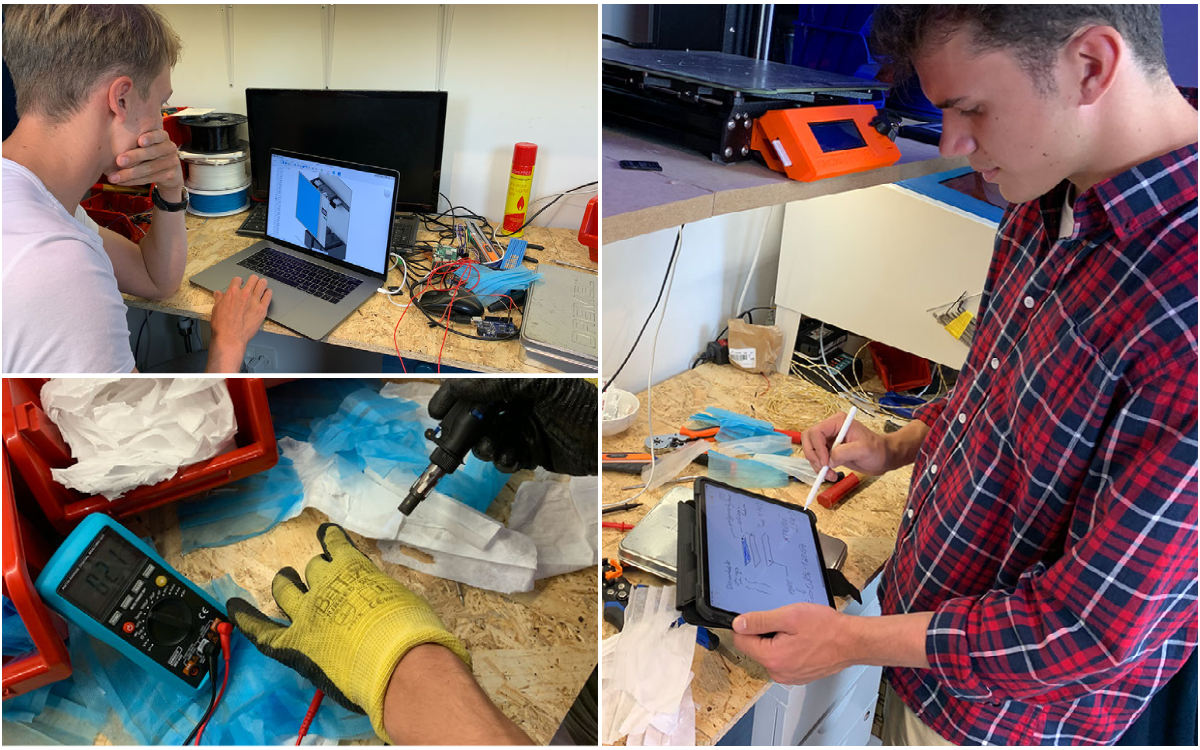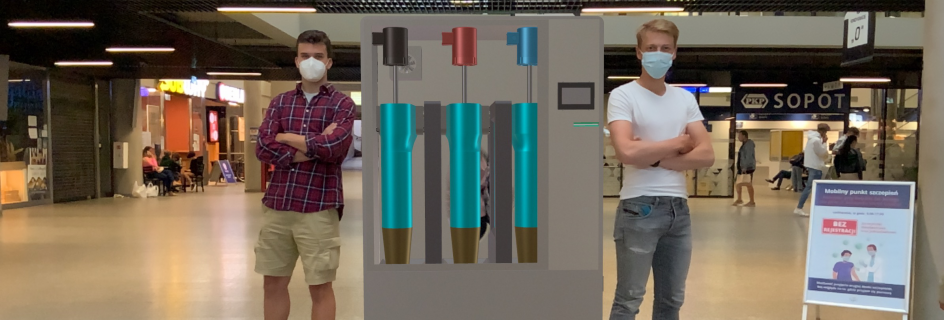Post date:
Edinburgh engineering student Aleksander Trakul and his friend Mike Ryan, have been crowned National Winners (Poland) of the James Dyson Award 2021 for their innovative face mask recycling solution.
Aleksander is in his third year of the BEng (Hons) Mechanical Engineering at the University of Edinburgh, while Mike is studying Biomedical Engineering at Warsaw University of Technology.
The James Dyson Award is a prestigious international award scheme for current and recent graduates, celebrating the next generation of design engineers. It offers a chance for budding inventors to make a name for themselves and gain a media platform to take their inventions further.
Face mask pollution problem
As the Covid-19 pandemic swept across the world, so too did a worrying new form of pollution: disposable face masks. While the efficacy of wearing a face mask to limit the spread of the virus is well documented, the environmental impact of non-biodegradable face masks presents a huge challenge.
Early on in the pandemic, Aleksander and Mike decided to take practical action by 3D printing face shields. They sent around 40,000 of these shields free-of-charge to medical institutions across Poland.
However they also noticed the widespread use of three-ply disposable surgical face masks, which are made from a family of polymer thermoplastics. After some research, the pair were shocked to learn that 129 billion of these single-use masks are used and thrown away across the world every month – adding to the already vast quantities of plastic pollution threatening the planet’s ecosystems.
Designing a solution
Working in Mike’s garage, the friends set out to engineer a solution to give disposable face masks a second life. They experimented with different processes and approaches, but with the same aims always in mind.
Aleksander explained, “We set three criteria for our future solution: sustainability, accessibility and scalability. The initial concept was to create a composite material, which could later be used in the production of cars, boats etc. We tried everything we could, from ironing to melting and heat binding, yet nothing seemed to quite work.”

After testing and refining each stage of the machine’s work – covering disinfection, shredding, cutting and melting of the face masks – they arrived at a complete system, which they named the XTRUDE ZERO.
How it works
The XTRUDE ZERO works by melting the face masks down to create a solid block of plastic that can be cut into pellets.
- Mask are inserted one-by-one onto the machine’s conveyor belt
- A series of rolling drums cut the welded sides of the mask off
- The mask’s three layers are separated out by rotating, sandpaper-covered cylinders and directed into separate funnels for shredding
- The shredded materials are directed into cylindrical containers and melted, forming a continuous strand of slender fibre known as filament 5. A rotary blade cuts the filament into individual pellets
- The pellets are ejected onto a shelf where they are disinfected by UV lights
These pellets can then be made into other useful materials, through engineering methods such as injection modelling, additive manufacturing and 3D printing.
Watch a video of the machine's assembly (no sound)
Future potential
As National Winners for Poland in the James Dyson Award, the team won a £2,000 cash prize and publicity support from the competition organisers. They will next progress to the International Final, where an overall winner will be announced on 17 November 2021.
Aleksander and Mike are now working to generate further funding, support and media interest to help them finalise their prototype in the coming months. They hope to secure interest from companies or local authorities to roll the system out in public spaces and are working on several ideas to incentivise people to use it.
Vending machine inspiration
“In an ideal world, people wouldn't need any motivation other than saving the planet to dispose of their face masks in a sustainable way,” said Aleksander. “But unfortunately that is not the case, so at the moment we're working on how to make people want to use our machine rather than chuck their face masks in a regular bin.”
One of their ideas is to use a glass-fronted vending machine-style design so that people can watch their face mask being recycled. They are also inspired by recycling machines in Germany and Austria, which provide money in exchange for recycled bottles.
“The mechanism itself isn't very, very complicated and I would say it’s very helpful,” explained Mike. “Because it's basically a big shredder with giant heating elements to turn the shredded masses into a filament. If we can get people to start coming to our machine and throwing face masks in we will be successful. But to make this happen we need to have as many of these machines as possible in as many places as possible.”
Support the project
If you’d like to support these young engineers with the implementation of their project, please contact them at info@xtrudezero.pl



